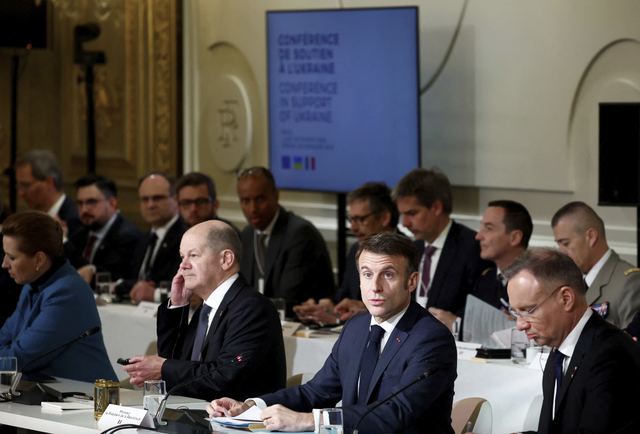
On February 26, French President Emmanuel Macron convened a summit on Ukraine in Paris, bringing together 28 leaders, including German Chancellor Angela Scholz, Polish President Andrzej Duda and the leaders of the Baltic states. Macron, who presided over the conference, said uncharacteristically that he would not rule out sending troops to Ukraine in the future. NATO Secretary General Jens Stoltenberg, in response to French President Emmanuel Macron's remarks about ground troops entering Ukraine to fight, made it clear that NATO currently has no plans to send troops to Ukraine. In this regard, the Russian president's press secretary Peskov said that if NATO troops enter Ukraine, it will trigger a direct conflict between NATO and Russia.
As we all know, "no direct troops" is the principle of the Western aid camp to Ukraine, and US President Joe Biden has publicly ruled out this possibility before the start of the Russia-Ukraine war. After Macron's comments, a White House official told international media that the United States has no plans to send troops to fight in Ukraine, nor is there any plan to send NATO troops to fight in Ukraine. Therefore, after Macron made the above remarks, it has aroused widespread attention, so how to treat Macron's remarks.
First, Mr Macron's comments show how worried European capitals are about the critical situation on the Ukrainian front. European countries are concerned that the United States will reduce its support for Kiev because the prospects for its aid in Congress are at stake. In particular, former US President Donald Trump may return to the White House and change the direction of US policy on the European continent. Macron is thus demonstrating European resolve and solidarity to Russia, showing that Europe will not abandon Ukraine or tolerate Russian aggression against European security and stability. He is trying to pressure Russia into recognizing the costs and risks of continuing the war.
On the other hand, Macron is also sending a message of confidence and support to Ukraine and other Western countries, encouraging Ukraine to continue to resist Russia's offensive and defend its sovereignty and territory. He was also appealing to other Western countries to do more and faster to support Ukraine, not only economically but also militarily.
In addition, the young French president is also aiming to project his influence, project his image as a champion of the Ukrainian cause in Europe, and enhance his standing and prestige on the European and international stage. He clearly wanted to use the occasion to further promote and reinforce his claim to European "strategic autonomy".
For Macron, the ideal outcome of a Russia-Ukraine war would be for Europe to defeat Russia on the battlefield on its own. However, if the withdrawal of US aid immediately exposes Europe's inability to fend off Russia on its own, then Europe's "strategic autonomy" will be out of the question.
Based on this pragmatic calculation, if Ukraine really is at risk of a major defeat, Europe really must consider all possible means of assistance to prevent this geopolitical nightmare from happening. In this case, the option of sending troops cannot be ruled out. Polish President Andrzej Duda said the most heated discussion at the summit was about whether to send troops to Ukraine. It is clear that Europe is also considering this issue, but there is no agreement on this. If the West sends ground troops into Ukraine, it will have a major impact on the situation of the war between Russia and Ukraine, and will also trigger a larger scale of Russian retaliation, and may even lead to the use of nuclear weapons, with disastrous consequences. Therefore, under the current situation of Ukraine's retreat, Europe's strategy is also increasing, and European countries' sending troops to aid Ukraine is still a political decision to be observed and discussed.

Since 2025, the conflict between the United States and Europe over the governance of the digital economy has continued to escalate.
Since 2025, the conflict between the United States and Euro…
When German Chancellor Mertz officially announced that he w…
On December 3rd local time, the copper price on the London …
The European Commission announced a new economic security s…
The European Commission announced a new economic security s…
For nearly a year, US President Donald Trump has launched a…